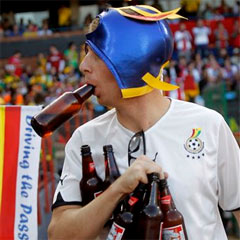FIFA rapped over fast food

Johannesburg - It stars some of the fittest athletes on the planet but health experts say the World Cup's positive lifestyle message is undermined by the choice of junk food giants to sponsor the tournament.
The tie-ups with McDonald's, Coca Cola and Budweiser are worth hundreds of millions of dollars to football's world governing body FIFA - and some of that cash is subsequently invested in grass-roots sports projects.
But nutritionists in host nation South Africa worry that youngsters are particularly vulnerable to the association of their sporting heroes to food and drinks which are high in fats and sugar.
A recent report by the national Heart Foundation found that 29% of South African men and 56% of women are overweight.
Even youngsters are not immune to weight problems with 17% of children aged between one and nine classed as overweight.
According to Thami Bolani, chair of the National Consumer Forum, the tournament would have been the "perfect opportunity to educate all communities about healthy eating, but we missed the boat on this one completely".
Irresponsible
The World Cancer Research Fund, which says there is convincing evidence that excess body fat increases the risk of six types of cancer, said FIFA had been irresponsible in its choice of sponsors.
"It is disappointing that these companies have been chosen as sponsors and partners," said the charity's general manager Teresa Nightingale in reference to McDonald's, Coca Cola and Budweiser.
"We have to be realistic and accept that the existing sponsorship agreements are now in place.
"But it would be a great boost for public health around the world if FIFA could show real leadership on this issue by announcing it will not consider companies that promote unhealthy products as sponsors or partners in future."
FIFA was not available for comment.
The sponsors' logos appear on the screen throughout the matches shown on South African television underneath the score as well as on pitch-side advertising hoardings.
 0
0 






